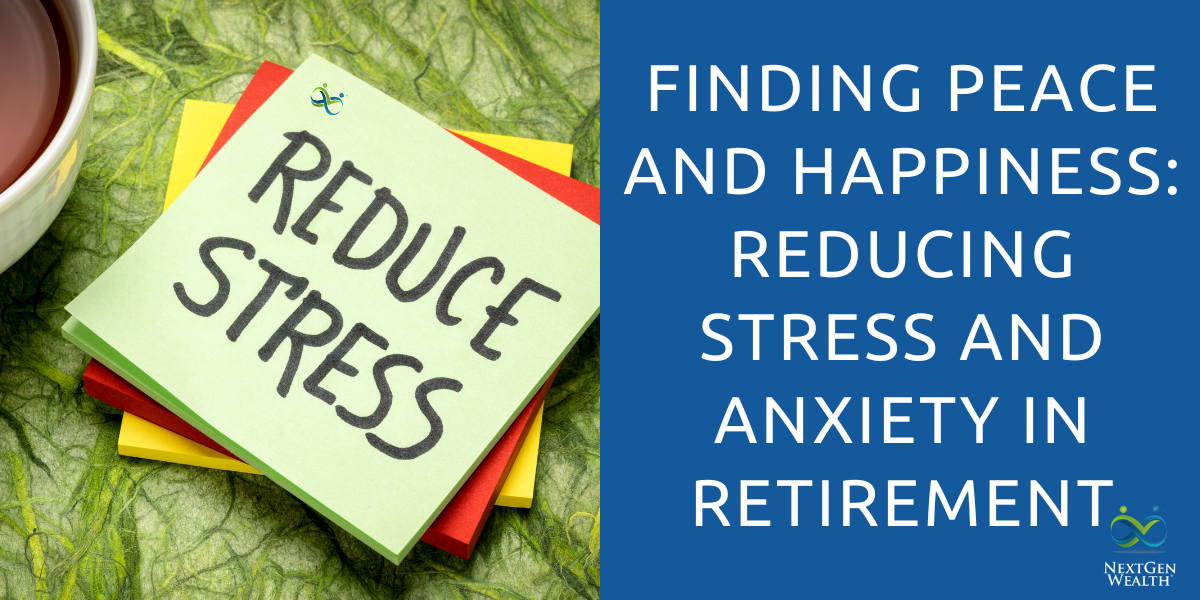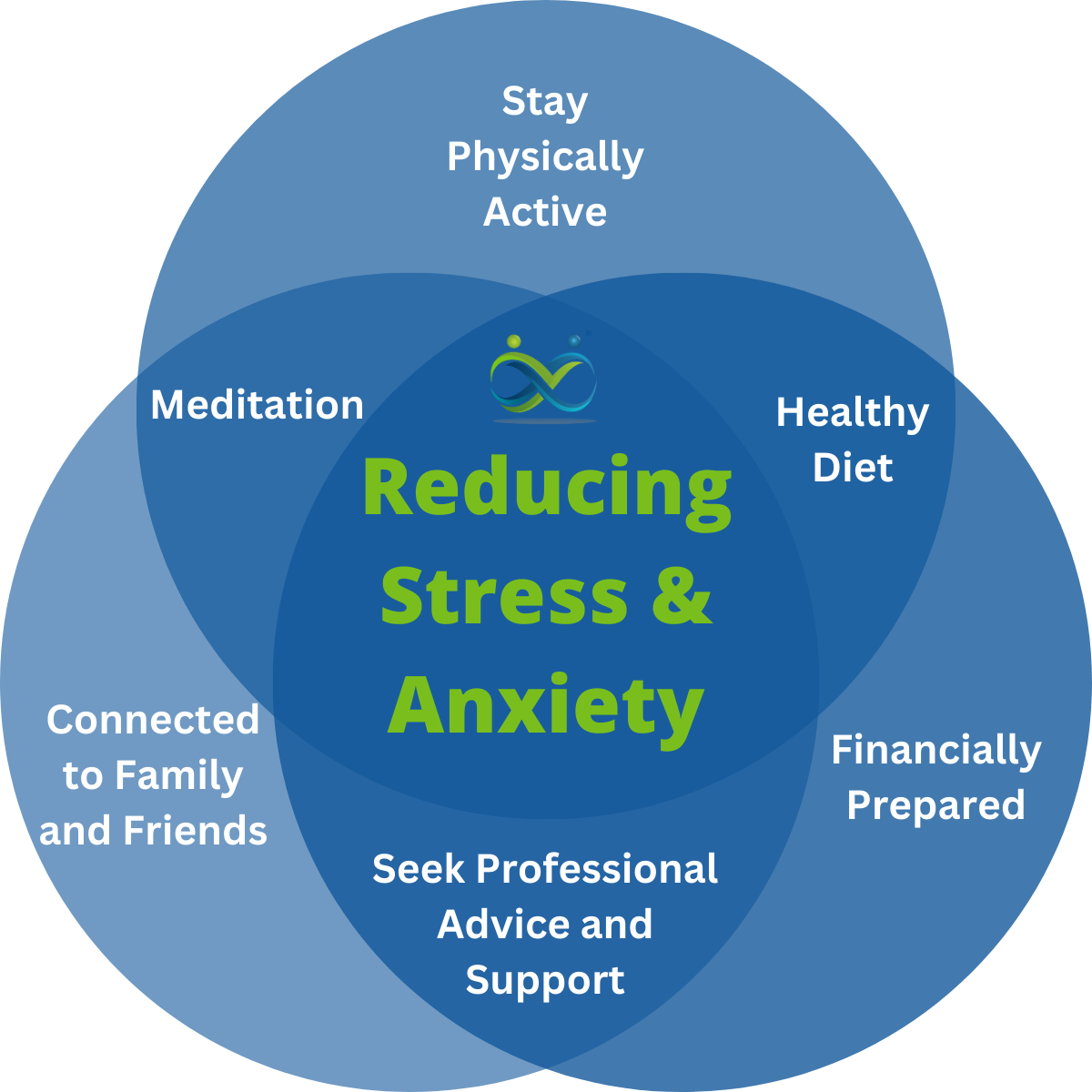Finding Peace and Happiness: Reducing Stress and Anxiety in Retirement

Retirement is supposed to be a time of relaxation, personal growth, and fulfillment. However, it can also bring unexpected challenges and uncertainties which can lead to stress and anxiety. It's crucial to prioritize your mental and financial well-being during retirement, as it directly impacts your overall happiness and quality of life.
We’ll explore some effective strategies to help you reduce stress and anxiety, allowing you to embrace your golden years with tranquility and peace of mind. One note, we’re not doctors or licensed therapists, so seek professional counseling or therapy if you’re feeling stress and anxiety.
Worried if you're going to have enough income to retire? Learn more here.
Taking Care of Your Health
Stay Physically Active
One of the best things you can do for your mental and physical health is to stay physically active. Find activities that you enjoy, such as going for walks, swimming, practicing yoga, or even trying tai chi. Not only will exercise keep your body physically fit, but it also releases endorphins, those wonderful natural mood boosters.
Aim for around 30 minutes of moderate intensity exercise most days of the week. Look for local community centers or fitness classes – they can be a great way to stay active and meet new people.
Eat Well
Taking care of your diet is essential for your mental and emotional well-being. Now that you have more control over meal planning and preparation, focus on eating a balanced and nutritious diet.
Load up on fruits, veggies, whole grains, lean proteins, and healthy fats. Try to limit processed foods, caffeine, and alcohol, as they can make anxiety worse. By nourishing your body with the right nutrients, you'll have the energy to tackle anything that comes your way.
Get Enough Rest and Sleep
Getting enough rest and quality sleep is key to reducing stress and anxiety. Retirement gives you the chance to establish a consistent sleep routine that suits your natural rhythm. Create a comfortable sleep environment, free from distractions, and develop a relaxing bedtime routine.
Avoid stimulating activities or screens right before bedtime. If sleep is a challenge, consider trying relaxation techniques like deep breathing, meditation, or listening to soothing music. Prioritizing restful sleep will help you wake up feeling refreshed and ready to take on the day.
Worried that you might run of money in retirement? Learn more here.
Building Social Connections
Building and maintaining connections with friends and family is vital to your wellbeing – before and after you retire. Even if you’re “not a people person,” you still need to have support systems around you.
Stay Connected
Retirement can sometimes lead to feelings of isolation and loneliness, which can contribute to stress and anxiety. It's important to maintain strong connections with your loved ones. Reach out to family and friends regularly, plan social activities, and make time for meaningful conversations.
You could also consider joining local clubs or organizations matching your interests – they're fantastic opportunities to meet new people and build friendships. Having a support network of people who care about you can provide the emotional support and companionship you need to reduce stress and anxiety.
Get Involved in Your Community
Retirement is a great time to give back and make a positive impact. Engaging in volunteer work or participating in community projects not only benefits others but also boosts your own well-being. Helping others gives you a sense of purpose and fulfillment, which can counteract stress and anxiety.
Look for volunteer opportunities at local charities, schools, or organizations that resonate with your values and interests. By being an active member of your community, you'll expand your horizons, meet new people, and experience the joy of making a difference.
Seek Support
If stress and anxiety persist despite your efforts, don't hesitate to seek additional support. Joining support groups tailored for retirees can provide a safe space to share experiences, exchange coping strategies, and gain insights from others going through similar challenges.
You could also consider consulting with a mental health professional. They can offer personalized guidance, therapy, or recommend interventions to help you effectively manage stress and anxiety in retirement.
Embracing Self-Care and Mindfulness
We know, it sounds a bit silly at first, but the way you think about things has an immense impact on your mood. As a matter of fact, the way we think about things causes most of our stress and anxiety, so it makes perfect sense to do some work in this area.
Practice Mindfulness Meditation
Mindfulness meditation is a powerful technique that promotes awareness of the present moment, reducing stress and anxiety. Take a few minutes each day to sit quietly, focus on your breath, and observe your thoughts and sensations without judgment.
As you become more skilled, incorporate mindfulness into your daily activities like eating, walking, or gardening. This practice helps you develop a deeper sense of calm, resilience, and acceptance, making it easier to navigate the challenges of retirement.
Pursue Hobbies and Creative Outlets
Engaging in hobbies and creative outlets is not only a fun way to pass the time but also a powerful stress-reliever. Whether it's painting, gardening, playing an instrument, or writing, immersing yourself in activities you enjoy brings a sense of fulfillment and relaxation. These creative pursuits provide an outlet for self-expression and allow you to tap into your passions and talents.
Prioritize Self-Care
Prioritizing self-care is essential for your overall well-being in retirement. It means setting aside time to focus on your physical, mental, and emotional needs. Engaging in activities that bring you joy, like taking walks in nature or indulging in a spa day, nourishes your soul and reduces stress. Remember, self-care is not selfish but a vital part of maintaining balance and enjoying a fulfilling retirement.

Financial Preparedness for Peace of Mind
Being financially prepared for retirement is a key factor in reducing stress and anxiety. Creating a budget helps you gain clarity on your income and expenses, ensuring you have a clear plan to cover your financial obligations. It allows you to make informed decisions and identify areas where you can save or invest wisely.
Invest Wisely
Investing your money wisely is an important aspect of financial preparedness. By diversifying your investments and seeking professional advice, you can maximize your returns and secure your financial future. Explore various investment options, such as stocks, bonds, or real estate, that align with your risk tolerance and long-term goals.
Get professional help
Seeking professional help from a financial advisor or financial planner can provide valuable guidance and expertise. A financial planner can assess your current financial situation, help you set achievable goals, and develop a personalized plan for your retirement.
At NextGen Wealth, we can offer insights into tax-efficient strategies, retirement accounts, and other investment opportunities to ensure you make informed choices. We can also help implement these strategies and dig through the fine details of your financial life, so you don’t have to worry about money anymore.
Final Thoughts on Reducing Stress and Anxiety
By embracing self-care and mindfulness, as well as being financially prepared, you can significantly reduce stress and anxiety in retirement. Engaging in your local community, hobbies, and volunteer work can nourish your well-being and enhances your overall quality of life.
Additionally, being financially prepared through budgeting, wise investments, and seeking professional advice provides a sense of security and peace of mind. It ensures you can meet your financial goals, maintain a comfortable lifestyle, and enjoy the retirement you've worked hard for.
With these strategies in place, you can navigate retirement with confidence, resilience, and a deep sense of contentment. As always, if you need help with anything, contact us for your retirement checkup.


